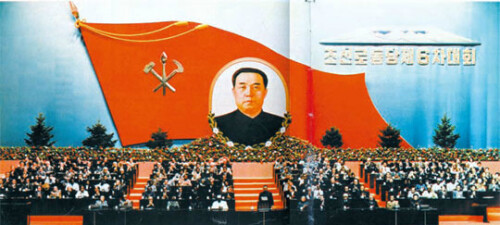hankyoreh
Links to other country sites 다른 나라 사이트 링크
North Korea announces Party Congress for May 6

North Korea formally announced on Apr. 27 that it will be holding its seventh Workers’ Party of Korea (WPK) congress on May 6.
The congress, which Pyongyang said in October would be held sometime around “early May,” is the first in the 36 years since the sixth event in Oct. 1980. This year’s event comes amid heavy international sanctions on the North in the wake of its fourth nuclear test on Jan. 6.
The staging of a WPK congress is an event of major significance in North Korea, where the party is the top leadership organization. It is also expected to serve as an important gauge of the future for the current regime, as it is the first since Kim Jong-un took over as the party’s first secretary.
“The central committee of the party’s politburo has decided to hold the seventh Workers’ Party of Korea [WPK] congress in the revolutionary capital of Pyongyang on May 6, 2016,” the Korean Central News Agency reported on Apr. 27.
While the length of the congress was not specified, South Korean Unification Ministry spokesperson Jeong Joon-hee said in a briefing the same day that it was “expected to last four to five days.”
The political bureau announced on Oct. 30 of last year that a decision had been made to convene the congress in early May 2016. This month, Kim was unanimously chosen as congress representative at city and county party representative meetings on Apr. 13, a People’s Army representatives’ meeting on Apr. 14, and 12 city and province party representative meetings through Apr. 25.
Experts said the main significance of the congress concerned normalizing WPK functions. During the so-called “arduous march” of the 1990s - as the North faced severe food and energy shortages and diplomatic isolation after the fall of the Soviet Union and Eastern European socialist states - then-leader Kim Jong-il focused on a “military first” governance approach that depended more heavily on the military than on the party. No party congress was held during his rule.
In contrast, his son Kim Jong-un has focused heavily on normalizing the WPK organization since ascending to power in early 2012.
“Party functions such as political bureau meetings and plenary meetings have increased since the Kim regime came to power,” noted Inje University professor Kim Yeon-chul. “This party congress appears to be part of that normalization process.”
One question is whether the North will hold regular congresses in the future. At a third party representatives‘ meeting in Sept. 2012, a pro forma provision calling for congresses every five year was stricken from the WPK bylaws.
The congress could feature the declaration in earnest of the “Kim Jong-un era,” with its two-track focus on nuclear and economic development, as well as organizational changes and a large-scale changing of the generational guard to bolster it.
Economic development strategies have traditionally been the chief topic at past congresses, and the May event could make official or expand on so-called “North Korean-style reform and openness measures” introduced by Kim since coming to power. The measures, which include the “new economic management system” announced on Jun. 28, 2012, and the “North Korean-style economic management approach” introduced on May 30, 2014, are designed to local autonomy and responsibility and offer incentives.
Another major congress focus is on unification ideas and visions for South Korea and foreign policy. But with inter-Korean relations and the external environment currently sour, many experts said the likelihood of a meaningful vision or proposal emerging appeared slim.
By Lee Je-hun and Kim Jin-cheol, staff reporters
Please direct questions or comments to [english@hani.co.kr]

Editorial・opinion
![[Column] Park Geun-hye déjà vu in Yoon Suk-yeol [Column] Park Geun-hye déjà vu in Yoon Suk-yeol](https://flexible.img.hani.co.kr/flexible/normal/500/300/imgdb/original/2024/0424/651713945113788.jpg) [Column] Park Geun-hye déjà vu in Yoon Suk-yeol
[Column] Park Geun-hye déjà vu in Yoon Suk-yeol![[Editorial] New weight of N. Korea’s nuclear threats makes dialogue all the more urgent [Editorial] New weight of N. Korea’s nuclear threats makes dialogue all the more urgent](https://flexible.img.hani.co.kr/flexible/normal/500/300/imgdb/original/2024/0424/7317139454662664.jpg) [Editorial] New weight of N. Korea’s nuclear threats makes dialogue all the more urgent
[Editorial] New weight of N. Korea’s nuclear threats makes dialogue all the more urgent- [Guest essay] The real reason Korea’s new right wants to dub Rhee a founding father
- [Column] ‘Choson’: Is it time we start referring to N. Korea in its own terms?
- [Editorial] Japan’s rewriting of history with Korea has gone too far
- [Column] The president’s questionable capacity for dialogue
- [Column] Are chaebol firms just pizza pies for families to divvy up as they please?
- [Column] Has Korea, too, crossed the Rubicon on China?
- [Correspondent’s column] In Japan’s alliance with US, echoes of its past alliances with UK
- [Editorial] Does Yoon think the Korean public is wrong?
Most viewed articles
- 1[Column] Park Geun-hye déjà vu in Yoon Suk-yeol
- 2Why Korea shouldn’t welcome Japan’s newly beefed up defense cooperation with US
- 3[Guest essay] The real reason Korea’s new right wants to dub Rhee a founding father
- 4Will NewJeans end up collateral damage in internal feud at K-pop juggernaut Hybe?
- 5Thursday to mark start of resignations by senior doctors amid standoff with government
- 6N. Korean hackers breached 10 defense contractors in South for months, police say
- 7[Column] ‘Choson’: Is it time we start referring to N. Korea in its own terms?
- 8Kim Jong-un expressed ‘satisfaction’ with nuclear counterstrike drill directed at South
- 9[Editorial] New weight of N. Korea’s nuclear threats makes dialogue all the more urgent
- 10Senior doctors cut hours, prepare to resign as government refuses to scrap medical reform plan